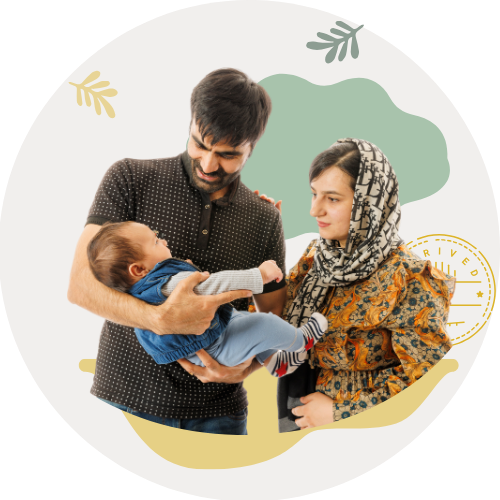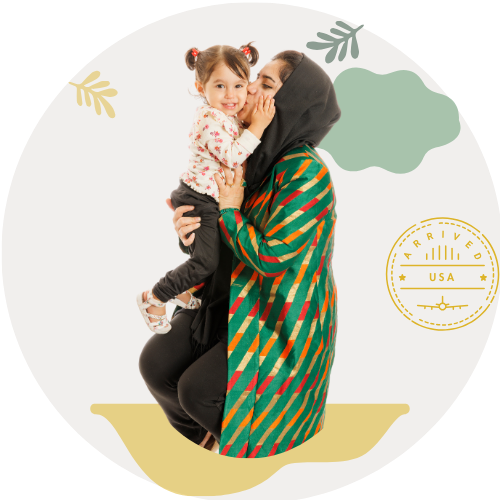Behtara Zhwand: An Afghan Adjustment Support Toolkit
Access to mental health services is challenging for Afghan newcomers, who often encounter linguistic, cultural, and logistical barriers when trying to seek help. In most locations where Afghans resettle in the U.S., there are few if any mental health providers that speak their language and understand their culture.
About the Name Behtara Zhwand means "better life" and is a combination of colloquially used words in both Dari and Pashto.
Some organizations have sought to meet the mental health needs of forcibly displaced people through community support groups led by trained peers. These interventions are often:
- Low-cost
- Free from linguistic barriers
- More culturally congruent
- Less stigmatized alternatives to individual counseling.
While they do not focus on specific mental health symptoms or conditions, studies show that psychosocial support groups for refugees help new arrivals build skills, make social connections, and feel more equipped to manage life in the United States.1,2,3
Building on this knowledge and seeking to address the mental health needs of Afghan newcomers in Sacramento, the IRC developed a community-based adjustment support group specifically tailored to the Afghan community. The group is designed to be led by staff from the Afghan community or trained and appropriately compensated community members.
IRC in Sacramento’s team used the Pathways to Wellness Community Adjustment Support curriculum as a foundation to develop an Afghan-specific adjustment support program. The team, which was 60% Afghan, used an iterative process, reviewing the existing curriculum, contextualizing the content for the Afghan community, and continuously seeking participant feedback. This allowed them to adapt the materials to be culturally responsive and linguistically accessible. By testing the curriculum with multiple cohorts and incorporating lessons learned, the final toolkit reflects the unique needs and preferences of the Afghan newcomer population. The final lessons and supporting materials were gathered to produce the Behtara Zhwand Afghan Adjustment Support Toolkit.
Human Rights
People who are forcibly displaced have commonly experienced violations of their human rights. Therefore, lessons should always strive to recognize and reinforce all human beings' inherent dignity and equal and inalienable rights regardless of nationality, ethnicity, immigration type, sex, sexual orientation, gender expression, race, religion, language, or any other status.
Do No Harm
The curriculum should always be delivered so that participants are not injured by facilitators' actions, even unintentionally. This means facilitators should understand the boundaries and safeguards set by their agency. In addition, facilitators should stay firmly within their scope and role and not seek to convey information or support clients in areas where they are untrained. Facilitators should feel comfortable saying, “I don’t know, but I can ask someone and come back later with an answer,” or “I am not the best person to help you with that. Why don’t I have someone reach out to you from our team.”
Participant-Centered
Participant-centered (or client-centered) work affirms that participants are best placed to decide their goals, are the most reliable reporters of their history and reality, and should determine which programs and services meet their needs. This means that facilitators should not challenge or minimize participants' feelings and perceptions (i.e., “that’s not a good way to think,” “you should cheer up,”, “things will get better,” etc.).
Strengths-Based
A strengths-based approach recognizes that all people have inherent strengths, including lived experience, talents, knowledge, and resiliency. Facilitators should seek to find participants’ strengths and elevate them (i.e., “That was a really interesting thing you just said,” “I like that comment,” “I am so impressed you were able to do that,” etc.)
Culturally Appropriate
Culture can be defined in many ways, and people often have multiple and intersecting cultural identities. Therefore, it is impossible to prescribe a specific “culturally appropriate” approach. Ideally, the facilitators share much of the same culture as participants and can present material in a way that includes deep cultural knowledge. If facilitators are not from the same culture, they should:
- Practice cultural humility throughout the delivery of the curriculum, meaning that they should practice self-awareness, including examining one’s own culture(s), including cultural beliefs and values, including implicit bias, assumptions, and judgments, while also working to understand another’s culture.
- Gain cultural knowledge – Gather information or seek consultation about a particular culture while understanding that individuals differ widely within cultures.
- Build skills – Working across cultures may require developing specific skills like working with interpreters, ways different cultures prefer engagement, and much more to ensure appropriate services.
Trauma-Informed
Afghan individuals, families, and communities have often been through multiple traumatic events that can erode feelings of safety, trust, power, and control. All work, including the delivery of Behtara Zhwand, should contribute to the restoration of these areas using established trauma-informed care principles and practices.
Plan
The Plan section consists of checklists and considerations that any organization can use to spark thinking and account for the logistics ahead of conducting an Afghan Adjustment Support Group.
Promote
The Promote section helps organizations outreach to Afghan individuals who may be interested in joining the group.
Present
The Present section contains the Afghan Adjustment Support curriculum. It is specifically designed so that it can be delivered with a minimum of materials.



